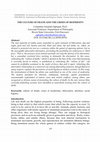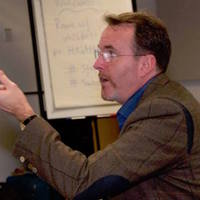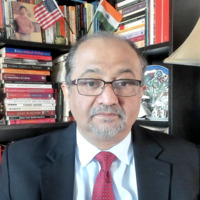Papers by Columbus Ogbujah
Dialogue and Universalism, 2024

Dialogue and Universalism, 2024
One sociological scheme that aided human survival from the Stone Age is the instinct for self-pre... more One sociological scheme that aided human survival from the Stone Age is the instinct for self-preservation. Humans, as Sigmund Freud notes, are "creatures among whose instinctual endowments are to be reckoned a powerful share of aggressiveness." 1 When combined with deceit, aggression becomes a potent tool both for survival and for conquest/expansion into new territories. Given, as Thomas Hobbes alluded that in the state of nature, life was solitary, poor, nasty, brutish, and short, 2 and owing to the Darwinian evolutionary historiology, which claims that only the fittest survived, the exhibition of brute force and crude acquisitive tendencies became salutary enterprises. Not surprisingly the acuity of the Latin maxim Homo homini lupus (Man is a wolf to man), is not contested in many quarters of intellectual scrutiny. Objectionable as this is, as a guiding principle, instances of man being a wolf to man are rife in every age and culture. Now and again, this proverb manifests not only in the commodification of others (slavery) by seeing them as potential helpers or sexual objects, but also in exploiting their capacity for work without adequate compensation, in sexually abusing them, in forcefully seizing their possessions, political power or territories, in swindling them, in humiliating them, in causing them pain, and in torturing and killing them. All of these occur in spite of robust positive laws of nation-states and multiple international charters. Following the realist conflict theory, this natural proclivity for individual self-preservation and the pursuit of self-interest always drives humans to subvert rules and promote self-goals. We can easily relate these to most of the world's crises: the shipment of black Africans to the West Indies and Europe for slavery, the inordinate ambition of Adolf Hitler for race purification that led to the extermination of millions of people during World War II, the insider trading at the Wall Street that led to the collapse of the world economy, the unsustainable exploitation of nature and industrial pollutions by corporations that have
Dialogue and Universalism, 2024
Dialogue and universalism, 2022

IGWEBUIKE: African Journal of Arts and Humanities, Oct 23, 2020
The vast majority of reality seems enmeshed in cyclic elements of bifurcation: day and night, goo... more The vast majority of reality seems enmeshed in cyclic elements of bifurcation: day and night, good and evil, heaven and hell, black and white, life and death, etc. Often, an element is projected not just as a contrary within the gamut of opposing options, but as the inescapable adversative alternative, precluding the possibility of a midcourse or 'third force.' That is, the presence of an element portends not only the absence of its alternative, but a somewhat contrived force working to dismantle the alternative. In this sense, cultivating the "culture of death," which is deemed as the base of the crises that humanity is currently forced to endure, is antithetical to cultivating the "culture of life". Life cannot be protably sustained in the midst of forces that pull it apart. Admitting this adversative relationship as a universal rule among bifurcating elements, though awed in many respects, explains the persistence of racial bigotry in modern societies. In this essay, the mistreatment of blacks by whites was underlined as one of the crises of modernity. The modern penchant for abortion, euthanasia, homicide, capital punishment, unsustainable exploitation of nature, wars and violent conicts, among others, was recognized as obvious means of promoting the culture of death. In the end, various blips currently bedeviling societies were identied as watersheds ensuing from the culture of death.
AMINTAPHIL: The Philosophical Foundations of Law and Justice
PHILOSOPHY AND PRAXIS, 2020
Journal of interdisciplinary studies, Jul 1, 2019

Everything within the created universe is sipped in polarity: male and female; black and white; h... more Everything within the created universe is sipped in polarity: male and female; black and white; heaven and earth; day and night; land and sea; rich and poor; animate and inanimate; physical and spiritual, etc. Everything seems to have its opposite from which it diverges. Being male or female and having a particular skin colour or cultural background are all givens upon which most intellectual processes and physical actions are built. Often, they become important sources for group identity, unity and also for exclusion. This exclusive tendency has led to negative stereotyping of women and ethnic minorities which in turn has been reinforced by discriminatory actions. Instead of appreciating their mutual complementarity, polarized thinking has created conflicts for agents at both ends, and has long been the source of marginalization of the weaker partner in the continuum: be it women or ethnic minorities.

People all over the world have values which at one time or the other could either be appreciated ... more People all over the world have values which at one time or the other could either be appreciated or abhorred depending on their usefulness. Such values, when they pertain to the individual, are termed individual values; to the family – family values; and to the society, they are properly termed societal/social values. In spite of the heterogeneity of Africa, there are still identifiable social standards indigenous to it, like the sense of communality; the sense of the sacredness of life; hospitality; time; respect for authority and the elders, etc. Cardinal among these is the sense of communality - the awareness which identifies an individual not as an isolated ego, but as an entity whose being and survival is consequent upon its union with other human beings within an identified locality. In the end, all the other cultural values were recognized as postscripts to this basic value. Aspects of these standards which are found to be useful for growth and development of Africa were iden...
Education entails leading man out from ‘darkness to light’, from ‘nature to nurture’ and from ‘an... more Education entails leading man out from ‘darkness to light’, from ‘nature to nurture’ and from ‘animality to humanity’. Dewey’s educational ideas have structured the educational foundation of civilized societies, and are currently molding that of the civilizing ones, including Nigeria. A meticulous look at the nation’s National Policy on Education reveals the depth and magnitude of inspiration derived from these ideas. A practical experience with education administrators discloses an atmosphere of a longing for the removal of all barriers towards implementing Dewey’s projections. However, his ‘relativization’ of values has left the Nigerian education industry worst off in terms of discipline and moral rectitude.
IOSR Journal of Humanities and Social Science, 2014

In the category of existents, life is the highest property; and within the gambit of the highest ... more In the category of existents, life is the highest property; and within the gambit of the highest property of existents, human life is the supreme good. Although most cultures and positive laws affirm this in principle, the reality is that human life has never been so threatened and demeaned as now. This essay highlighted how, by devising multiple ways of extinguishing life, the 21st century revels in the culture of death left over by the previous era. It identified the ruins of two World Wars; the spate of genocide, murder and fratricidal strife; the instantiation of policies supporting abortion, infanticide and euthanasia; the exploitation of nature resulting in natural disasters; and the greed of individualism, as blips which have all too often been aided by globalization to universally advance the “culture of death” as the new norm. The essay concluded by making a strong case for the defence of human life, rejection of a culture of death, and the cultivation of the “culture of li...

Benedict de Spinoza (1632–1677) was about the most radical of the early modern philosophers who d... more Benedict de Spinoza (1632–1677) was about the most radical of the early modern philosophers who developed a unique metaphysics that inspired an intriguing moral philosophy, fusing insights from ancient Stoicism, Cartesian metaphysics, Hobbes and medieval Jewish rationalism. While helping to ground the Enlightenment, Spinoza’s thoughts, against the intellectual mood of the time, divorced transcendence from divinity, equating God with nature. His extremely naturalistic views of reality constructed an ethical structure that links the control of human passion to virtue and happiness. By denying objective significance to things aside from human desires and beliefs, he is considered an anti-realist; and by endorsing a vision of reality according to which everyone ought to seek their own advantage, he is branded ethical egoist. This essay identified the varying influences of Spinoza’s moral anti-realism and ethical egoism on post-modernist thinkers who decried the “naïve faith” in objectiv...

A cyborg, also known as a cybernetic organism, is a being with both biological and artificial val... more A cyborg, also known as a cybernetic organism, is a being with both biological and artificial values. Real (as opposed to fictional) cyborgs are more frequently people who use cybernetic technology, like the Brain-Computer Interface, to repair or overcome the physical and mental constraints of their bodies. The Brain-Computer Interface (BCI), sometimes called divert neural interface or Brain-Machine Interface (BMI) is a divert communication pathway between a brain and an external device which aims at assisting, augmenting or repairing human cognitive or sensory-motor functions. It consists of systems that transform biological signals recorded from neural tissue into electronic signals that control a computer interface. Once such a control is attained, it can then be translated into a system that can control a machine or a physical device or can even stimulate or activate biological tissues. Its principal goal is to enable people with neural pathways that have been damaged by ampu...

The 2016 launch of the courier giant—Dalsey, Hillblom, and Lynn’s (DHL) Advanced Regional Centre ... more The 2016 launch of the courier giant—Dalsey, Hillblom, and Lynn’s (DHL) Advanced Regional Centre (ARC) in Singapore—was significant not just for the scale of the facility and its impressive level of innovation, but for the visual identity and branding of DHL’s red and yellow corporate colours. These colours, as is evident in all branding, set it out from the rest, and have become a symbol of power and domination. This resonates with the use of colour categories to isolate human beings into unjust classes that manifest divisive social and racial hierarchies. The symbolism of colourism and ethnicism viewed either plainly or as metaphors, lies in the “othering” of fellow human beings for discrimination and scapegoating. The markers are the same, whether in the case of George Floyd or the victims of discrimination and/or recurrent massacres in Nigeria. This essay explores how, by creating a visible barge of “otherness,” the current political leadership either shirked responsibility in t...

Filosofia Theoretica: Journal of African Philosophy, Culture and Religions
In ethics and political philosophy, the concepts of equity, equality, need satisfaction, and just... more In ethics and political philosophy, the concepts of equity, equality, need satisfaction, and justice are significant for the fulfilment of underlying requirements of human rights, and the attainment of peace in societies. Studies show these as potential frames for defining processes, distributing resources, sharing responsibilities, allocating rewards, demonstrating respect and dispensing with unequal treatments. Justice, as the ideal that impels us to impartially adjudicate between competent claims, is linked to equality. But as the moral force that propels actions for needs’ satisfaction, it is linked to equity. Hence, equality and equity are two elements of the theory of justice: both are grounded on the principles of distributive justice. This ‘common grounding’ apparently obfuscates their distinctive features, and over time, has elicited their equiparation. This essay highlights the archetypal frames of the notions of equity and equality as indispensable principles of social ju...

Journal of Interdisciplinary Studies
In the past few decades, a lot has changed in the world. There is now a global dimension to every... more In the past few decades, a lot has changed in the world. There is now a global dimension to every societal value. Globalization has unlocked the local and national perceptions to a broader outlook of an interconnected and interdependent world. People are mingling in the world like never before. But these come with new challenges, new social regulations and controls that require adoption of new values, all of which foist on people competing and often incompatible demands between work and family, and have led to the erosion of pivotal values that hitherto bonded families together. Today, marriages are few, divorces are many, and the number of children born to unmarried, single parents has skyrocketed, with shocking social consequences. This essay unravels the apparent chaos in marital and family ethics arising from an unhindered freedom of choice in a globalized era, and proposes a rediscovery of sound traditional family values as a solution.

Journal of Interdisciplinary Studies
In the past few decades, a lot has changed in the world. There is now a global dimension to every... more In the past few decades, a lot has changed in the world. There is now a global dimension to every societal value. Globalization has unlocked the local and national perceptions to a broader outlook of an interconnected and interdependent world. People are mingling in the world like never before. But these come with new challenges, new social regulations and controls that require adoption of new values, all of which foist on people competing and often incompatible demands between work and family, and have led to the erosion of pivotal values that hitherto bonded families together. Today, marriages are few, divorces are many, and the number of children born to unmarried, single parents has skyrocketed, with shocking social consequences. This essay unravels the apparent chaos in marital and family ethics arising from an unhindered freedom of choice in a globalized era, and proposes a rediscovery of sound traditional family values as a solution.











Uploads
Papers by Columbus Ogbujah